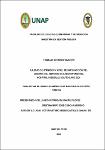Calidad de atención y nivel de satisfacción del usuario del servicio de laboratorio del hospital III EsSalud Iquitos año 2024

Date
2025Author
Murayari Florez, Janeth Patricia
Concha Moreno Cristina Mercedes
Metadata
Show full item recordAbstract
Providing quality healthcare services is a significant challenge for hospitals. It is not just about having good facilities, but also about creating an environment of trust and human warmth. It is the people who work in the hospital, with their dedication and empathy, who make a difference in the lives of patients. Caring for the health and well-being of each person is a fundamental right that must always be promoted and protected. In this research study, conducted in 2024, we sought to find and determine the relationship between the quality of care and the level of satisfaction of users of the laboratory service at Hospital III of EsSalud Iquitos. The research work was of an applied type, with a non experimental design, a quantitative approach, with a descriptive-correlational level of study and a cross-sectional or transversal cut. A sample of 384 users was used, the sampling was non-probabilistic for convenience, choosing the users who attended the laboratory service until reaching the sample number. The reliability of the data collection instrument was measured with Cronbach's Alpha, which, according to the range table, determines that the instrument is excellent with a coefficient of 0.941. The descriptive statistical result of the data showed that the study variables, quality of care and level of satisfaction, were valued by the respondents as good at 87% and 88% respectively, and in the results of the inferential statistics the Rho coefficient of Spearman obtained a low direct correlation of 0.154, with a 2-tailed sig. of 0.003, accepting the general hypothesis Hi, which indicates the existence of a significant relationship between both variables. Analyzing the results obtained in the descriptive and inferential statistical processing of data, it is concluded that the majority of users perceive the quality of care and the level of satisfaction as good and in some dimensions as moderately good, but the direct and low coefficient of Spearman's Rho, although significant, shows that there is practically no relationship between both variables, which determines that patients accept infrastructure and care deficiencies as normal, their objective being to be treated in order to continue with their health treatment. Ofrecer servicios de salud de calidad es un desafío importante para los hospitales. No se trata solo de tener buenas instalaciones, sino de crear un ambiente de confianza y calidez humana. Son las personas que trabajan en el hospital, con su dedicación y empatía, quienes marcan la diferencia en la vida de los pacientes. Cuidar de la salud y el bienestar de cada persona es un derecho fundamental que se debe promover y proteger siempre. En este estudio de investigación, realizado en el año 2024, se buscó encontrar y determinar la relación entre la calidad de atención y el nivel de satisfacción de los usuarios del servicio de laboratorio del Hospital III de EsSalud Iquitos. El trabajo de investigación fue de tipo aplicado, de diseño no experimental, de enfoque cuantitativo, con un nivel de estudio descriptivo-correlacional y de corte transeccional o transversal, se utilizó una muestra de 384 usuarios, el muestreo fue no probabilístico por conveniencia, escogiendo a los usuarios que asistieron al servicio de laboratorio hasta alcanzar el número muestral. La fiabilidad del instrumento de recolección de datos se medió con el Alfa de Cronbach que, según la tabla de rangos se determina que el instrumento es excelente con un coeficiente de 0.941. El resultado estadístico descriptivo de datos arrojó que las variables de estudio, calidad de atención y nivel de satisfacción, fueron valoradas por los encuestados como buenas en un 87% y 88% respectivamente, y en los resultados de la estadística inferencial el coeficiente Rho de Spearman obtuvo una correlación directa baja de 0.154, con sig. bilateral de 0.003, aceptando la hipótesis general Hi, que indica la existencia de una relación significativa entre ambas variables. Analizando los resultados obtenidos en el procesamiento estadístico de datos descriptivos e inferenciales se concluye que, los usuarios en su mayoría perciben la calidad de atención y el nivel de satisfacción como bueno y en algunas dimensiones como medianamente bueno, pero el coeficiente directo y bajo del Rho de Spearman aunque significativo, demuestra que prácticamente no hay relación entre ambas variables, lo que determina que los pacientes aceptan las deficiencias de infraestructura y atención como normales, siendo su objetivo ser atendidos para poder continuar con su tratamiento de salud.

